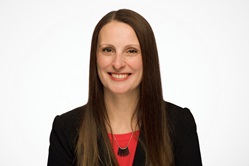As a product manager with the Critical Performance Improvement (CPI) team, which is charged with addressing the quality of the prescriptions that cross the Surescripts network, Rachel Petersen oversees Sentinel™, a data analysis engine that monitors the accuracy of e-prescriptions and pinpoints areas for improvement. Rachel’s portfolio also allows her to work with the latest technologies and explore artificial intelligence (AI) and machine learning. “Those are all things that are really popular and hot right now, so it's fun to be able to talk about them in an actual professional use case, rather than just reading about them in Popular Science.”
 1. How would you talk about the need for prescription accuracy at a cocktail party?
1. How would you talk about the need for prescription accuracy at a cocktail party?
I talk about what we're doing to ensure that prescribers use the same descriptions and pharmacists are using the same codes and the same patient directions. That we’re trying to make the process more efficient and accurate, so that when you get to the pharmacy with your two-year-old who has an ear infection and is crying, you can pick the medicine up right away and get out of there. You don't have to spend 20 minutes with them in pain, wandering the aisles of the pharmacy. That resonates, especially when I talk to parents or people that are at the doctor frequently.
2. When you meet up with colleagues who care about prescription accuracy, what are you talking about lately?
We’re talking a lot about opioids. How can we use accurate prescription data to better support our colleagues who are developing technology to help address opioid fraud and abuse? One benefit of standardized data is that it’s easier to measure and analyze. For example, if you want to understand how often a particular opioid is being prescribed, or how it’s being prescribed, if the data is consistent, it makes for easier filtering. If there’s a single standard, we can make better use of the data and possibly identify opportunities to help address the problem.
3. Not counting colleagues at Surescripts, who do you consider influencers, innovators or leaders?
Kenneth Berger, the first product manager for Slack, which is an instant message collaboration tool, has an approach to data that I love. He talks a lot about solving for the “need” rather than the stated “requirement”, which is what good product managers should do. Dig deeper. Of course, the way that eBay and PayPal have built their cultures around product and data-driven product decisions, I think is really awesome. Airbnb is also enabling their entire business to use data in their decision making process, and they've done it by ensuring every employee takes Statistics 101. I think that's fascinating.
4. Who or what inspires you?
What's inspiring to me is how many people are touched by the work that I'm doing, and what a difference it can make in the lives of everyday people. Now, not every doctor is e-prescribing, but just last month, 73% of the nation’s doctors utilized e-prescribing on the Surescripts network. So the reach is so broad and the stakes are so high, which sometimes keeps me up at night, but I'm also super excited about how Sentinel and the Critical Performance Improvement program are removing potential problems and improving prescription quality every day. I feel really good about that. I love what I do.
5. It’s 2028. What are you most proud of having helped accomplish in healthcare?
We’ll be using machine learning and AI to flag potential problems before they get to the pharmacy. Sentinel will help us to innovate and break new ground: We’ve reined in the opioid crisis, and maybe we've eliminated it by then. I'm hoping that the work that we’ll be doing over time with potential new drugs, say those that might come out for Alzheimer's, are really making a difference in people's lives. And in those disease states, that we can provide data to help doctors get the right prescriptions, dosing and instructions, so that people continue to benefit from our standardized data and what we're doing with prescription accuracy.
Don't miss Rachel's talk, Measuring Prescription Accuracy, at the ASAP Annual Conference on January 25. And to learn more about how Surescripts is tackling prescription accuracy, rising drug costs, interoperability and more, subscribe to Intelligence in Action.


 Dean Riggott Photography
Surescripts
Dean Riggott Photography
Surescripts